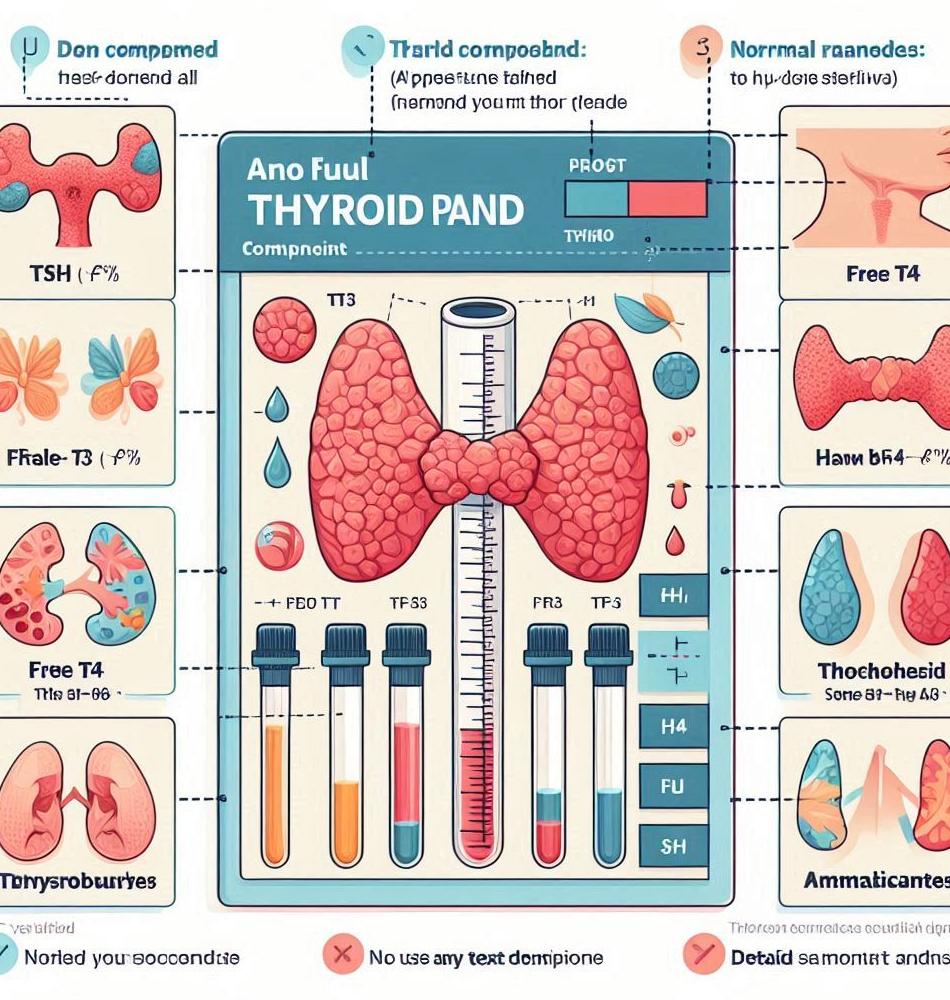Understanding the Full Thyroid Panel: A Comprehensive Guide 🩺
Discover what a full thyroid panel includes, its significance, and how it helps assess thyroid health in this comprehensive article.
Introduction 🧬
The thyroid is a tiny butterfly-shaped gland located at the base of our neck, playing a crucial role in regulating multiple bodily functions, including metabolism, growth, and development. To ensure this gland is performing optimally, healthcare providers often recommend a full thyroid panel. Yet, what exactly does a full thyroid panel include and why is it important? In this engaging article, we will delve into the components of a full thyroid panel and its significance in assessing thyroid health.
What is a Full Thyroid Panel? 🩺
A full thyroid panel is a comprehensive blood test that evaluates how well the thyroid gland is functioning. It provides essential information regarding the production of thyroid hormones and the overall health of the thyroid gland. The panel typically consists of several key tests, each measuring different hormones and proteins. Let's break down these components for a better understanding.
Key Components of a Full Thyroid Panel 🧪
1. Thyroid-Stimulating Hormone (TSH) 📈
TSH is secreted by the pituitary gland and plays a pivotal role in regulating thyroid hormone levels. A high TSH level often indicates an underactive thyroid, also known as hypothyroidism. Conversely, a low TSH level might suggest an overactive thyroid or hyperthyroidism. Testing TSH levels is typically the first step in assessing thyroid function.
2. Free Triiodothyronine (Free T3) 🌟
Free T3 is one of the two main hormones produced by the thyroid gland. It is responsible for regulating various bodily functions such as heart rate and metabolism. Measuring Free T3 levels provides insights into how effectively the thyroid is working. Elevated levels may signal hyperthyroidism, while low levels may indicate hypothyroidism.
3. Free Thyroxine (Free T4) 🔄
Free T4 is another key thyroid hormone involved in metabolism and energy production. Similar to Free T3, Free T4 helps in understanding the thyroid's functionality. High Free T4 levels suggest hyperthyroidism, while low levels are typically associated with hypothyroidism.
4. Thyroid Antibodies ❤️🩹
There are several antibodies that can be assessed to evaluate autoimmune thyroid diseases, such as Hashimoto's thyroiditis and Graves' disease. The most common antibodies include:
- Anti-thyroid peroxidase (TPO) antibodies- Anti-thyroglobulin antibodies- Thyroid receptor antibodiesThe presence of these antibodies signifies an autoimmune response against the thyroid, which can lead to abnormal thyroid function.
Why is a Full Thyroid Panel Important? 📊
Understanding how the thyroid gland functions is vital for maintaining overall health. Here are several reasons why a full thyroid panel is important:
1. Identifying Thyroid Disorders ⚠️
A full thyroid panel aids in diagnosing thyroid conditions like hypothyroidism, hyperthyroidism, Hashimoto's thyroiditis, and Graves' disease. Early detection is critical for effective management.
2. Monitoring Existing Conditions 📅
For those already diagnosed with thyroid disorders, a full thyroid panel is essential for monitoring hormone levels, adjusting treatments, and ensuring the overall wellness of the patient.
3. Evaluating Symptoms 🎢
Symptoms related to thyroid dysfunction can often be vague and easily overlooked. Components of the full thyroid panel provide a clearer picture, helping healthcare providers determine the underlying cause of symptoms such as fatigue, weight gain or loss, and mood changes.
How is a Full Thyroid Panel Performed? 🩸
The process of getting a full thyroid panel is relatively straightforward. Here is an overview of what to expect:
1. Sample Collection 📋
A healthcare professional will draw a small sample of blood, usually from a vein in the arm. This is a simple and quick procedure.
2. Laboratory Analysis 🧪
The collected blood sample is sent to a laboratory, where it is analyzed for the various components of the full thyroid panel. Results are typically available within a few days.
3. Interpretation of Results ❓
Once the results are received, a healthcare provider will review them and discuss their implications with the patient. Any abnormalities may lead to further testing or treatment.
Common Questions about Full Thyroid Panels 🤔
- What should I do to prepare for a full thyroid panel?- Is fasting required before the test?- Can medications affect the results of a thyroid panel?- How often should one have a full thyroid panel?- What do I do if my results are abnormal?Conclusion 🏁
A full thyroid panel is an invaluable tool for assessing thyroid health. By measuring TSH, Free T3, Free T4, and thyroid antibodies, healthcare providers can diagnose thyroid conditions, monitor existing health issues, and evaluate concerning symptoms. Given the crucial functions of the thyroid gland, understanding what is included in a full thyroid panel allows for better health management and an informed approach to personal wellness.
.png)





